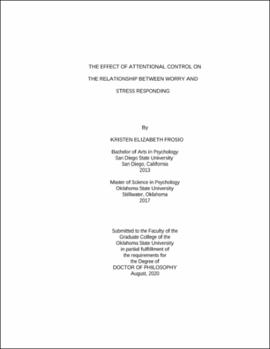| dc.contributor.advisor | Grant, DeMond M. | |
| dc.contributor.author | Frosio, Kristen Elizabeth | |
| dc.date.accessioned | 2021-02-22T22:24:01Z | |
| dc.date.available | 2021-02-22T22:24:01Z | |
| dc.date.issued | 2020-08 | |
| dc.identifier.uri | https://hdl.handle.net/11244/328599 | |
| dc.description.abstract | Worry is a form of negative perseverative thinking and a maladaptive cognitive emotion regulation strategy associated with multiple forms of psychopathology (Nolen-Hoeksema & Watkins, 2011; Cisler et al., 2010). Perseverative worry may be exacerbated by deficits in attentional control (Armstrong et al., 2011). Attentional control is the ability to voluntarily shift and disengage attention while utilizing cognitive resources selectively to inhibit the processing of extraneous or irrelevant stimuli (Derryberry & Reed, 2002; Friedman & Miyake, 2004). Current influential theories propose that individuals high in attentional control are able to use attention to regulate their emotions (Oschner & Gross, 2008). However, low attentional control may be a cognitive vulnerability factor for developing pathological forms of anxiety due to a broad failure to deploy regulatory processes that directly influence changes in physiological stress responding (Armstrong et al., 2011). The current study evaluated whether trait attentional control mediated the relationship between trait worry and cortisol stress response after a psychosocial stressor. Participants (N=95) completed several self-report measures, the Trier Social Stress Test, and provided three saliva samples to measure cortisol stress response throughout the experiment. Results indicated that attentional control did not mediate the relationship between trait worry and cortisol stress response. However, exploratory analyses revealed that attentional control did moderate the relationship between cortisol stress response and self-reported acute worry during the stress recovery phase. Specifically, at low levels of attentional control, decreases in cortisol stress response predicted increases in acute worry levels post-stressor. These findings point toward alternative cognitive control measures better explaining the relationship between trait worry and cortisol stress responding (e.g. working memory, attentional biases). These findings also point toward attentional control potentially impacting the relationship between worry and physiological responses to stress. Specifically, worry may contribute to alterations in attentional control and stress, only to perpetuate enhanced negative feedback sensitivity of the HPA-axis and maintain the cycle of cortisol dysregulation-but only at low levels of attentional control. | |
| dc.format | application/pdf | |
| dc.language | en_US | |
| dc.rights | Copyright is held by the author who has granted the Oklahoma State University Library the non-exclusive right to share this material in its institutional repository. Contact Digital Library Services at lib-dls@okstate.edu or 405-744-9161 for the permission policy on the use, reproduction or distribution of this material. | |
| dc.title | Effect of attentional control on the relationship between worry and stress responding | |
| dc.contributor.committeeMember | Byrd-Craven, Jennifer | |
| dc.contributor.committeeMember | Wells, Tony T. | |
| dc.contributor.committeeMember | Malone, Chad | |
| osu.filename | Frosio_okstate_0664D_16672.pdf | |
| osu.accesstype | Open Access | |
| dc.type.genre | Dissertation | |
| dc.type.material | Text | |
| thesis.degree.discipline | Psychology | |
| thesis.degree.grantor | Oklahoma State University | |
